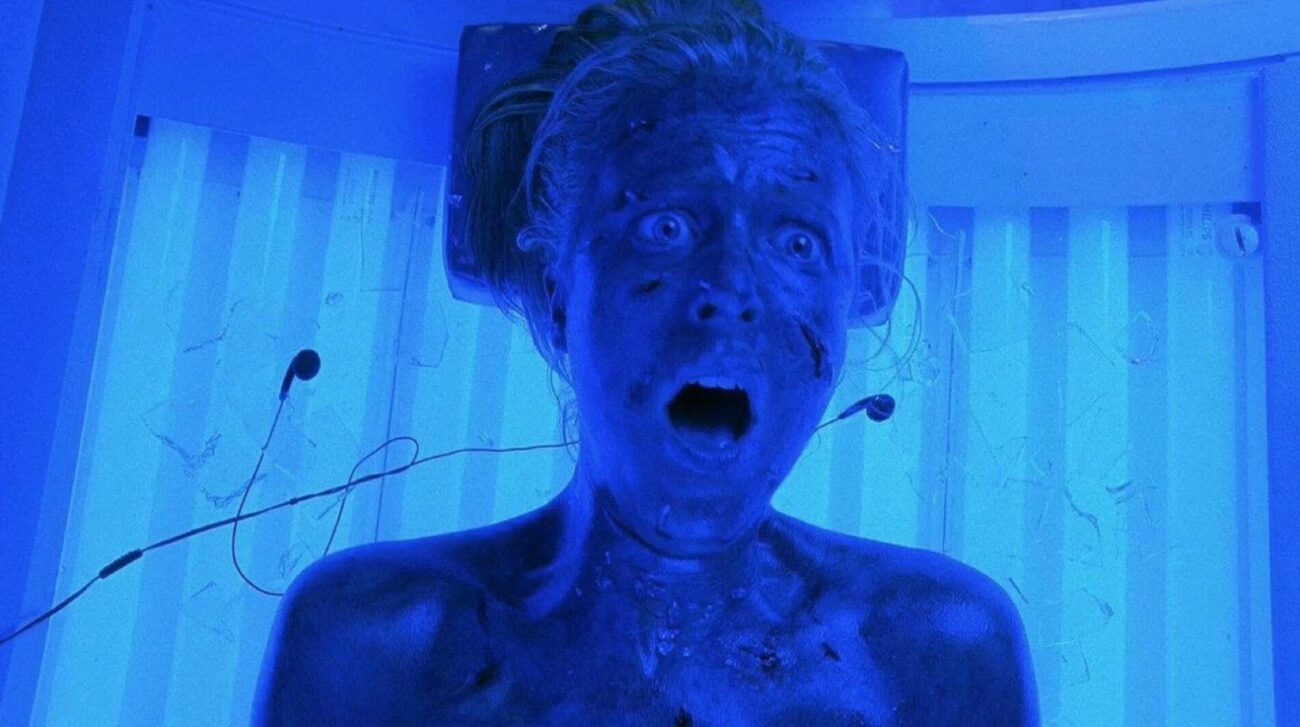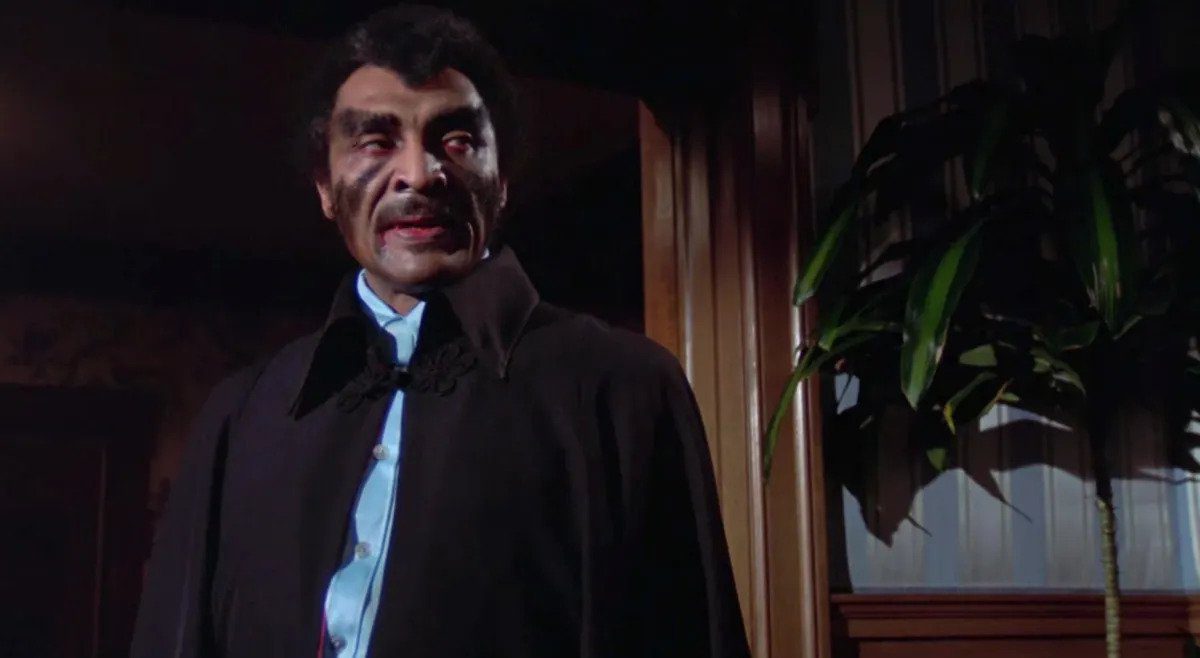I’m a sucker for a good revenge movie. There are few things I enjoy more than watching despicable villains get their comeuppance at the hands of the people they’ve wronged, so naturally, the first time I sat down to watch Park Chan-wook’s classic revenge thriller Oldboy, I was brimming with excitement. I had heard nothing but rave reviews, and I couldn’t wait for the cathartic release of good, old-fashioned revenge.
But to my surprise, that’s not at all what I got. See, despite usually being considered a revenge film, Oldboy is really more of an anti-revenge story. It makes us think we’re going to revel in the bloody glory of vengeance, but at the very last minute, it flips the script on us and becomes much deeper and more meaningful than we could’ve imagined. It makes for one of the best surprise endings in cinematic history, so let’s take a deep dive into this hard-hitting classic and see just how it turns the typical revenge template completely on its head.
The Plot of Oldboy
But before we get into the nitty-gritty, let’s take a moment to go over the basic plot of the movie. Oldboy centers around a seemingly normal businessman named Oh Dae-su, but one day, after being arrested for public drunkenness, his entire world gets turned upside down. He finds himself kidnapped by an unknown assailant, and he’s kept in a sealed hotel room for 15 years.
During that time, Dae-su never learns who locked him up, so when he finally gets out, he wants revenge. He quickly meets a sushi chef named Mi-do, and even though she’s much younger than him, the two fall in love almost immediately. She helps him slowly track down his kidnapper, and he eventually finds out that it’s a guy named Lee Woo-jin, one of his old classmates.
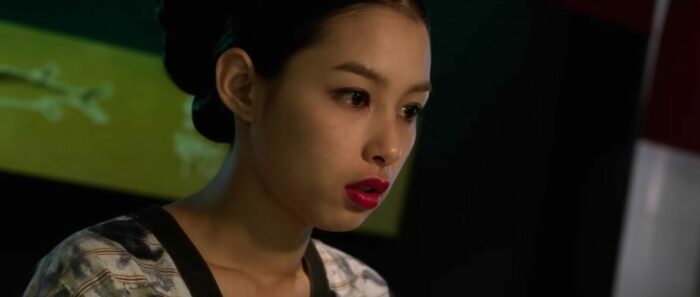
After a bit of digging, Dae-su uncovers a lost memory from his school days, and he correctly surmises that it holds the key to his 15-year imprisonment. See, back when he was a student, he once saw Woo-jin committing incest with his sister, and he told one of his friends about it. Soon afterwards, rumors began to circulate that led the sister to commit suicide, and Woo-jin blames Dae-su for her death.
But that’s just the tip of the iceberg. In the final few scenes of Oldboy, our protagonist learns that Woo-jin didn’t just lock him up for a decade and a half. He also kept a close eye on the guy’s young daughter, and when she was finally old enough, he had her and her father hypnotized so they would fall in love.
That’s right, Mi-do is actually Dae-su’s daughter, and when Woo-jin threatens to tell her who her new boyfriend really is, Dae-su quickly forgets all about his quest for revenge. He grovels at the man’s feet and begs for his forgiveness, and he debases himself in some pretty shocking ways.
With his vengeance now complete, Woo-jin walks off and shoots himself in the head, and Dae-su has himself hypnotized one more time so he can forget that Mi-do is his daughter. However, it’s not entirely clear that this second hypnosis works, as the final shot shows him embracing Mi-do with an ambiguous grimace on his face.
Setting up the Surprise
Now that we know what Oldboy is about, it’s time to dive deep and get to the good stuff. Like I said before, the film makes us think we’re watching a typical revenge story, so I want to begin by looking at some of the ways it tricks us and sets up its big surprise. Most obviously, the entire premise of a man out for revenge makes us think the movie is going to be about, well, a guy getting revenge, but there are also a few subtler clues that point in that same direction.
For starters, we have Dae-su’s look. When Oldboy begins, he looks like a pretty average businessman, and you might even think he’s a bit of a wimp. He just gives off the vibe of a guy who couldn’t fight his way out of a paper bag, so you’d never peg him as the star of a revenge thriller.
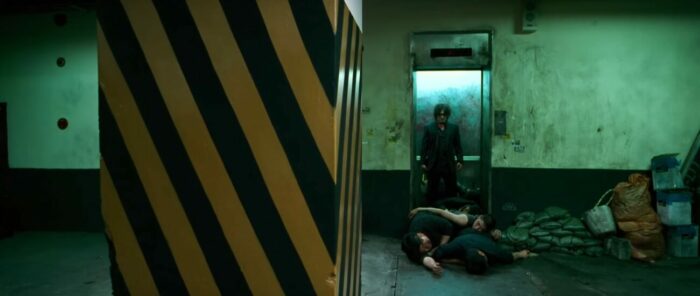
But after he’s released from his captivity, he’s a completely different person. Everything about him, from his hairstyle to his clothes, gives off a nearly tangible aura of badassery, so just know he’s going to rip through anybody who stands in his way. In fact, you almost feel bad for whoever kidnapped him, and you can’t wait to see him get his revenge.
And when Dae-su finally gets the chance to show off what he can do, this guy does not disappoint. There are a couple of cool fights that showcase just how dangerous he is, but the best one is hands down the famous hallway scene where he beats up a whole gang of weapon-carrying thugs all by himself. It’s a beautifully executed single-take brawl, and it lets us know without a doubt that Dae-su is a legit action hero. He’s more than capable of completing his mission, so we have every reason to believe he will.
The True Nature of Revenge
But as you well know, things don’t quite turn out the way he expected, and when Oldboy finally reveals its secrets, it doesn’t just subvert our expectations of this particular story. The film casts the entire concept of vengeance in a new light, and from that vantage point, the revenge business doesn’t look nearly as glamorous as we might’ve thought.
On the most basic level, the fact that Woo-jin is also seeking vengeance should make us stop and think. Even though Oldboy sets him up as the villain, he’s really not all that different from Dae-su. Both of these men are trying to get back at people who’ve wronged them in some way, so if Dae-su is justified in his quest for revenge, Woo-jin must be too.
However, nobody who watches the movie can actually believe that. Woo-jin is undeniably an evil character, so there’s really only one conclusion we can draw: Dae-su’s pursuit of vengeance is also indefensible. In fact, this film forces us to acknowledge that all revenge is morally wrong. It’s the driving force behind Woo-jin’s villainy, so the movie takes a very clear stand against it in general.
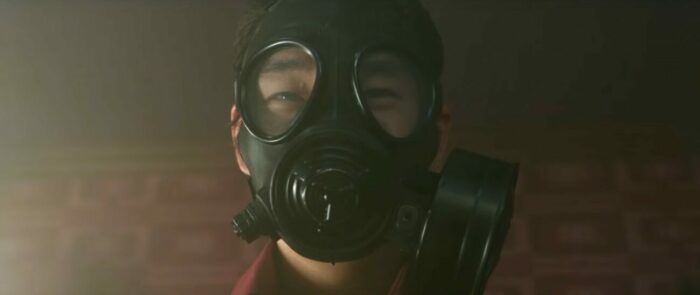
That being said, this point doesn’t quite hit home until the very end of the film. When we get to the final confrontation between Dae-su and Woo-jin, we already know the basics of Woo-jin’s pursuit of vengeance, but we don’t think much of it. We’re still on Dae-su’s side, and we still want Woo-jin to get what’s coming to him.
But that all changes when Dae-su learns that Mi-do is his daughter. He immediately forgets about his own quest for revenge, and he admits that he greatly wronged Woo-jin and his sister. And the way I see it, that’s when the movie’s main point really hits us. This scene allows us to realize that Woo-jin’s pursuit of vengeance has the same moral standing as Dae-su’s, so if one of these men is clearly in the wrong, the other must be as well. It’s all or nothing, and Oldboy forces us to acknowledge that revenge is simply not acceptable.
The Harmful Effects of Vengeance
On top of that general condemnation, Oldboy also highlights the harmful effects vengeance can have on those who seek it. Like I said before, once Woo-jin’s revenge is complete, he kills himself, presumably because he has nothing left to live for. Granted, the film does imply that this might not be the only factor, but it’s tough to deny that it’s at least a big part of his motivation.
If the guy has gone to such great lengths to get back at Dae-su for his sister’s death, he must have been entirely consumed by his hatred and his thirst for vengeance. It was almost certainly the only thing that got him out of bed every morning, so it stands to reason that it would leave him with nothing to live for once he achieved it.
When we turn back to Dae-su, we don’t find anything quite as definitive, but Oldboy does hint that revenge has had a similar effect on him as well. Once he figures out why he was locked up for 15 years, Mi-do asks if they can leave this all behind and run away together to a place where Woo-jin can’t find them. She thinks Dae-su’s quest is over, but he just can’t let it go. He responds, “I can’t end like this. Seeking revenge has become a part of me,” and he carries on with his mission.
To be fair, there’s a bit more wiggle room here than there was with Woo-jin. Dae-su only says that revenge is a part of him, not that it’s consumed his entire life, but that’s still pretty bad. If he had just walked away from this sordid affair like Mi-do asked him to, the two of them could’ve lived happily ever after. But he didn’t. His insatiable hunger for vengeance led him to the third act of this story, and that’s where everything fell apart for him.
So once again, we see that revenge isn’t just morally wrong. It also consumes the people who seek it, and it has some very harmful effects in their own lives, not just the lives of their victims. Granted, in Dae-su’s case, we see that principle play out more on a thematic level than on the literal narrative level, but either way, the point still stands.
More Important Than Revenge
Last but not least, I want to take a closer look at the final few scenes of Oldboy. When Dae-su learns who Mi-do really is, his first instinct is to try to kill Woo-jin, but that all changes when Woo-jin threatens to have one of his lackeys tell Mi-do that her boyfriend is really her father.
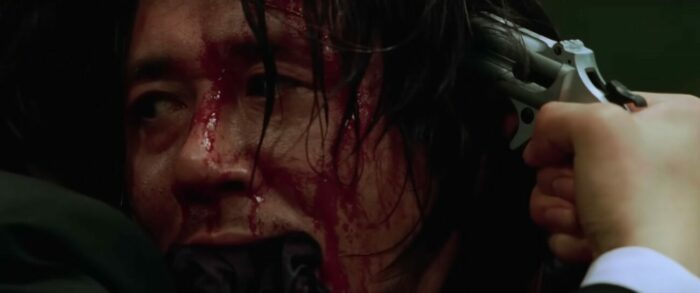
Dae-su immediately drops to his knees and begs Woo-jin to spare her the burden of this terrible truth, and he apologizes for all the pain he caused by gossiping about him and his sister. Then, he debases himself even further by acting like a dog, and he proceeds to cut off his tongue as a sort of gruesome penance.
In a word, Dae-su forgets all about his pursuit of vengeance, so even though this quest has almost entirely consumed him, he’s still able to recognize that it’s not the most important thing in his life. Rather, protecting the people he loves here and now takes priority over avenging the wrongs of the past, and that’s hugely significant. It means that there are better ways to spend your time than trying to get back at the people who’ve hurt you, and that gives us yet another reason to abandon the pursuit of vengeance altogether.
An Anti-Vengeance Revenge Thriller
To some viewers, this unflinching stand against vengeance is probably a huge disappointment. When we watch a revenge film, we want to see the good guy end up on top and get the cathartic release he so desperately seeks, but Oldboy absolutely refuses to go down that well-worn path. Instead, the movie completely flips the script on us in the final few scenes, and it gives us a much more thoughtful and realistic appraisal of vengeance than we’re probably used to.
It shows us that revenge is far from the glorious and noble pursuit most films make it out to be. Instead, it’s an insidious cancer that turns innocent (and sometimes not-so-innocent!) people into villains themselves, and it consumes the lives of those who seek it. In a word, there’s simply nothing good about it, and few movies embody this important truth as well as Park Chan-wook’s classic thriller Oldboy.


